Share
Working at ESO
Are you interested in working in areas of frontline technology and in a stimulating international environment? Do you feel your profile matches our requirements? Learn more about our current vacancies and apply online. Read more..
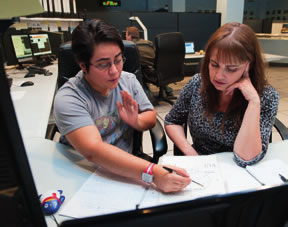
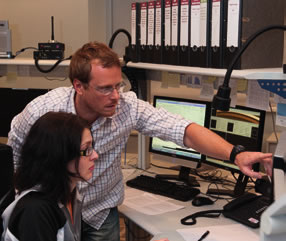
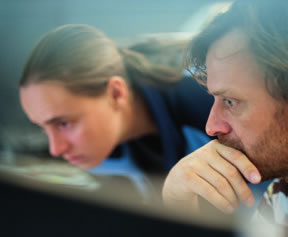
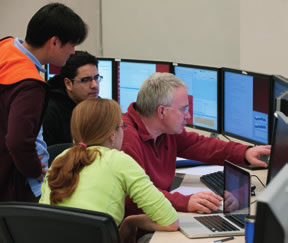
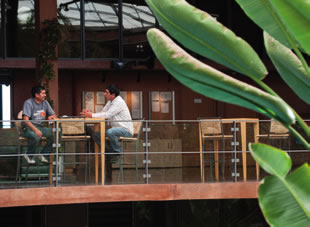
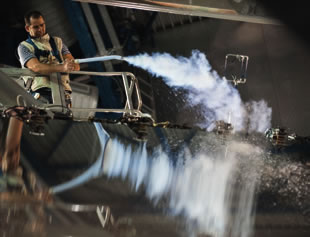
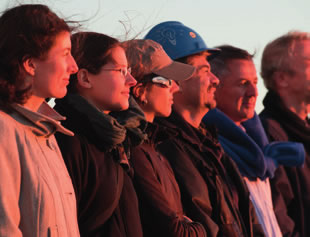
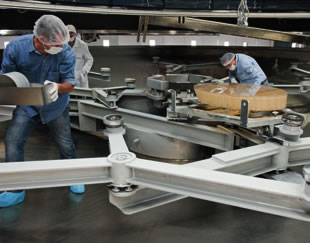
The European Organisation for Astronomical Research in the Southern Hemisphere (ESO) is the foremost intergovernmental astronomy organisation in Europe and the world's most productive ground-based astronomical observatory. ESO carries out an ambitious programme focused on the design, construction and operation of powerful ground-based observing facilities enabling astronomers to make important scientific discoveries. ESO operates three unique world-class observing sites in northern Chile: La Silla, Paranal and Chajnantor (home to ALMA), and the ESO Headquarters are located in Garching, near Munich, Germany. At Paranal, ESO operates the Very Large Telescope, the world's most advanced visible-light astronomical observatory, and will host and operate the southern array of the Cherenkov Telescope Array, the world's largest and most sensitive high energy gamma-ray observatory. ESO is a major partner in ALMA. On Cerro Armazones, ESO is building the 39-metre Extremely Large Telescope (ELT), which will become "the world's biggest eye on the sky" and whose operations will be fully integrated into the Paranal Observatory.
For its Maintenance, Support and Engineering (MSE), ESO is inviting students from European and Chilean Universities in their career's last period, to participate in the following programme:
Winter Internship 2023
Paranal
Deadline 22/05/2023
The MSE Department of the Paranal Observatory provides technical support to the four VLT 8-m telescopes, to the VLT Interferometer with its auxiliary telescopes and to all instruments available for scientific observations. The telescopes and instruments are complex systems that involve many advanced technologies and require a high level of engineering support. The MSE Department of Paranal has a total workforce of 80 engineers and technicians distributed in 6 engineering groups. The following are the five projects proposed for the Winter period 2023. They can start anytime between June and September 2023 and can last between 3 and 6 months depending on the topic and availability of the student. Please enquire if you are not sure.
I. "Using AI for planning and reporting tools of Observatory activities”
The Paranal Observatory is preparing to host the largest telescope in the world, the ELT. For our Integrated Operations Programme, we are developing pathfinder tools to support the planning and reporting of activities in an efficient manner for the various engineering groups. The internship will consist in first creating a visualization tool of activities based on information in different data sources, and second in producing automated reports for individuals and groups toward different stakeholders using large language models like GPT.
Objectives:
- Define requirements for the project with stakeholders and create a simple project plan.
- Understand the various data sources and the way to extract data from them.
- Define overall architecture and understand Devops and CI/CD framework used at Observatory.
- Evaluate various visualization techniques and tools to present data into a timeline or plan, implement, test and validate with users.
- Define reporting structure from the various activities, automatic data retrieval and manual entries, and creation of report using GPT oriented to various group size (individual report to group report), time frames (weekly to monthly and quarterly), and readers (technical and management)
Student Profile:
- Student of software engineer, mathematical engineer or related.
- Proven experience in data analysis using: pandas, numpy, Jupyter, GIT.
- Knowledge in NLP, Transformers (GPT like).
- Understanding of standard planning and scheduling techniques, advanced knowledge of Excel.
- Desirable experience in scikit-learn, PyTorch, Hugging Face.
- Proactive, motivated and capable to work in teams of people.
Duration and Shift:
Six (6) months. Schedule to be confirmed.
II. "Performance study of time series DB / Employee rostering solution”
We are looking for a highly motivated last year student of Computer Science, Electronic Engineering or equivalent with a curriculum in programming to join in our winter student internship program. In this role, you will have the opportunity to work on projects that involve evaluating and implementing operational tools in Paranal MSE Department.
Your primary responsibility will be to evaluate time series databases for store Paranal telemetry and to be compatible with ELT choices. You will be responsible for setting up a time series database test bench, evaluate its performance, and providing a comparison report with recommendations. This will be supported by literature review on time series databases used in similar industries and will provide quantitative information to support the choice of a long-term database.
In addition to evaluating time series databases, on a best effort basis, you will also work on adapting a third-party tool for operational roles assignment, a mathematical optimization problem called "Employee Rostering". This task is currently done by hand and takes a lot of time. Your responsibility will be to oversee the evaluation and deployment of the tool for daily usage. You will work together with the customer to configure the tool for operational role assignment, provide automations that connect MSE datasources with tool input, and install the tool for wider access.
As an intern, you will have the opportunity to perform other tasks related to our operational tools ecosystem, applying Devops practices and tools such as GIT.
We are looking for someone who is proficient in Linux, complex package installations, and familiar with concepts of networks. Knowledge in Devops practices and tools such as GIT is a desirable extra. You should be proactive, motivated, and capable of working in teams of people.
If you are passionate about data and looking for an opportunity to gain valuable experience in evaluating and implementing operational tools, we encourage you to apply for this position.
Objectives:
- Time series DB evaluation:
* Do a literature review on times series databases used in similar industries.
* Setup a timeseries DB test bench and do comparable measurements.
* Write a comparison report with reccomendations.
- Employee Rostering:
* Work together with the customer to configure the tool for operational role assignment.
* Provide automations that connects MSE datasources with tool input.
* Install the tool for wider access.
Student Profile:
- Students of Computer Engineering or equivalent with curriculum in programming and backend-oriented profile.
- Important competencies:
* Advanced Database knowledge, especially NoSQL.
* Python, DB client libraries.
* Proficient in Linux, complex package installations, docker, git, concepts of networks.
- Desirable competencies:
* Experience working with time series (Aggregations, algorithms, etc).
* Java.
* Knowledge in DevOps practices and tools.
* Proactive, motivated and capable to work in teams of people.
Duration and Shift:
Six (6) months. Schedule to be confirmed.
III. "MACAO Membrane Obsolescence”
MACAO (Multi Application Curvature Adaptive Optics) is an adaptive optics (AO) system operating at the VLT. This system was developed for adaptive compensation of turbulence induced wavefront error. The wavefront sensing used by the MACAO systems are based on wavefront curvature sensing (mainly described in the literature by F.Roddier and Al.) Each MACAO systems used a 60 elements bimorph mirror DM and wavefront sensors made of:
- A vibrating membrane mirror at telescope focus
- Optical relays
- Lenslet arrays matching the DM actuators geometrical distribution
- Avalanche Photodiodes (APD) as detector
- Real Time Computer (RTC)
This project will focus on the characterization of the vibrating membrane mirror element, providing intra- and extra-focal measurement, in the frame of an obsolescence plan.
These membrane mirrors are Al-coated films (10mm diam.- 2um thickness) which curvature is driven at 2100Hz by sound pressure, in order to sense the 2nd derivative of the incoming wavefront. An important system parameter is the amplitude of vibration of the membrane (stroke) which is proposed to be measured through an optical test bench.
Objectives:
- Membrane measurements and characterization.
- Absolute RoC vs the applied Stroke.
- RoC linearity vs the applied Stroke.
- RoC symmetry: Intra-focus vs Extra-focus RoC.
- Membrane phase-lag measurement.
- Accelerated life testing.
- Validation of the in-house Al-Coating.
- Validation of membrane films cleaning.
- Reporting the measurement campaigns.
- Tweeters measurements.
Student Profile:
- Student: technology/engineering field
- Experience in optics, opto-electronics, electronics.
Duration and Shift:
Three to Four months. Working schedule to be confirmed.
IV. "Preventive Maintenance Optimization (PMO) at LPO Observatory”
Preventative Maintenance Optimization (PMO) is the practice of continuously improving the efficiency of preventative maintenance (PM) activities by regularly reviewing failure modes, frequencies, duration, scope, and resources. PMO evaluates existing PM activities and ensures that all maintenance tasks are adding true value to the operation. This activity will be an examination of the external PM Plans and the development of a case study at the Paranal Observatory.
Objectives:
- Study and understand the methodology for PMO defined in Paranal.
- Collect data and promote a pilot application for a system of interest.
- Prepare PMO.
- Define System or Equipment according to Reliability Requirements.
- Review Existing PM.
- Identify areas of improvement (Failure mode, frequency, duration, scope, and resources)
- Develop related documentation related to the group requirement.
- Deliver a report about what was done (problems, steps, benefits, recommendations)
- To provide a presentation to the MSE/SQA group and other stakeholders.
Student Profile:
- Student of industrial, mechanical, or electrical engineering in the last semester of career or graduated, preferable.
- Good command of English.
- Knowledge of SQL database.
- Knowledge of previous experience on any CMMS/ITS systems.
- Knowledge of KPI and Dashboard.
- Knowledge of Maintenance Strategies.
Duration and Shift:
Six (6) months from June 2023. The working schedule will be 8x6.
V. "Study the application of novel methods for coated mirrors in-situ cleaning for ELT and VLT"
A critical aspect for the maintenance of the ELT is to keep its primary mirror as clean as possible between periods of recoating (normally every 2 years). We are studying in-situ cleaning techniques. There is an existing test bench in Paranal for the testing of brushes, plus the materials to test another method based on electrostatic repulsion. The analysis and results shall provide valuable knowledge to also explore new alternatives of in-situ cleaning of mirrors that are challenging to clean because of their position (e.g. UT Coude train) and also the larger mirrors that are cleaned and recoated on a regular basis at the VLT. We want to conduct those tests on site in real conditions of observations. In fact, only in the last years we have been able to make a lot of conclusions on the long term behavior of protected silver mirrors at Paranal. The objectives of the internship are:
- Study the ongoing in-situ test plan and continue it until finalization. There are two methods being explored, one is based on brushes using capillary effect to remove dust, and the other is based on humidity enhanced electrostatic repulsion.
- Document all aspects of the in-situ cleaning test bench
- Learn to use the existing optical metrology instrumentation and prepare procedures and workflow for their operation.
- Prepare a final report of the study with the option to become a co-author of the paper that will be published in an engineering journal.
Deatiled Objectives
- Study and understand the importance of in-situ cleaning for telescope performance
- Review existing literature and identify gaps, challenges, and other relevant information
- Study and understand the operational constraints for implementing a system on 39mt diameter segmented telescope mirror
- Study the ongoing in-situ test plan and continue it until finalization. There are two methods being explored, one is based on brushes using capillary effect to remove dust, and the other is based on humidity enhanced electrostatic repulsion.
- Document all aspects of the in-situ cleaning test bench
- Learn to use the existing optical metrology instrumentation and prepare procedures and workflow for their operation.
- Together with the work package manager, prepare a final report of the study for the ELT program management.
- Put together the information in a scientific way so that it can be presented to the community. Optionally, the student is given the opportunity to co-author a paper with the results of study.
Student Profile
- Pre-grad or post-grad student of any relevant engineering discipline with a strong background of materials, nano-structures, metallurgy, or similar. Ideally, some experience in the use of lab equipment such as light microscopes, spectrophotometers, etc.
- Ability to conduct scientific protocol in an organized and rigorous manner.
- Be capable to work with scientific databases (mostly in English) to collect relevant information of similar projects (literature review)
Duration and Shift:
Six (6) months. The working schedule will be 8x6.
Duty Station:
Paranal Observatory located 120 km south of the city of Antofagasta, Chile.
We Offer:
ESO offers a special allowance during the period you are performing your apprenticeship with us. For students travelling to the observatory, transportation arrangements (plane tickets) from and to Santiago will be provided by ESO, with accommodation provided on site.
Application:
We invite all students from European and Chilean Universities in their career's last period to apply. The apprenticeship should be supported by the University (Letter should be provided). If you are interested in working in areas of frontline technology and in a stimulating international environment, you are invited to apply online at http://recruitment.eso.org/.
Applications must be completed in English and should include a CV and a motivational letter indicating the project(s) you are interested to apply to.
For further information on Paranal Engineering apprenticeships, we invite you to take a look at the following page: http://www.eso.org/sci/facilities/paranal/paranalenginternship.html
Closing date for applications is 15 May 2023.
ESO Values:
An important element in any successful employment relationship is harmony in values between an organisation and its people.
The ESO values are:
ESO strives for excellence through innovation.
ESO provides outstanding services to its communities.
ESO fosters diversity & inclusion.
ESO believes in the key role of sustainability for its future.
Achieving the above are recognized as only possible on the basis of personal values and attitudes that we expect from our employees: respect, integrity, accountability, commitment, collaboration, and clear & open communication. Applicants to any ESO role are asked to reflect on their affinity with these values and advised they may be asked about them if called for interview.
Diversity:
ESO has established diversity as an important value of the Organisation, is committed to providing an equal opportunities environment and is actively seeking to promote a diverse, equitable and inclusive workforce. Please visit https://www.eso.org/public/about-eso/sustainability/dei-at-eso/ for further details.
